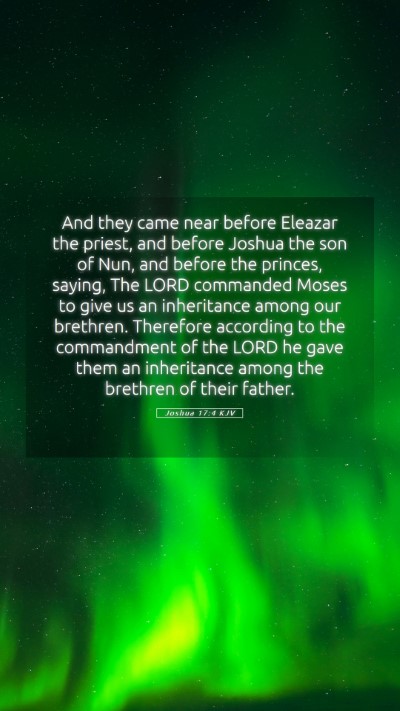Old Testament
Genesis Exodus Leviticus Numbers Deuteronomy Joshua Judges Ruth 1 Samuel 2 Samuel 1 Kings 2 Kings 1 Chronicles 2 Chronicles Ezra Nehemiah Esther Job Psalms Proverbs Ecclesiastes Song of Solomon Isaiah Jeremiah Lamentations Ezekiel Daniel Hosea Joel Amos Obadiah Jonah Micah Nahum Habakkuk Zephaniah Haggai Zechariah MalachiJoshua 17:4 Meaning
What is the meaning of Joshua 17:4?
And they came near before Eleazar the priest, and before Joshua the son of Nun, and before the princes, saying, The LORD commanded Moses to give us an inheritance among our brethren. Therefore according to the commandment of the LORD he gave them an inheritance among the brethren of their father.
Joshua 17:4 Bible Verse Meaning
Bible Verse Meaning: Joshua 17:4
Joshua 17:4 states: "And they came near before Eleazar the priest, and before Joshua the son of Nun, and before the princes, saying, The Lord commanded Moses to give us an inheritance among our brethren." This verse highlights the context of the land distribution among the tribes of Israel, emphasizing the importance of divine guidance and inheritance.
Understanding the Verse
This verse is a significant part of the narrative where the tribes of Manasseh approach the leadership to assert their claim to the inheritance that was promised to them. It reflects their reliance on God’s instructions as communicated through Moses.
Commentary Insights
-
Matthew Henry's Commentary:
Matthew Henry emphasizes that the request for inheritance was not merely a social custom but rooted in God's command. The approach reflects their assurance that God's decree would be fulfilled, signifying both faith and the importance of communal legacy within Israel’s families.
-
Albert Barnes' Notes:
Albert Barnes notes that the act of coming near to Eleazar and Joshua signifies a formal presentation of their request. He points out the legal and spiritual connotation of claiming inheritance and mentions the significance of seeking the counsel of the leaders appointed by God.
-
Adam Clarke's Commentary:
Adam Clarke provides insights into the historical significance of this claim. He elaborates on the urgency of the heirs of Manasseh and their desire to establish their rightful place within the Promised Land, indicating a strong sense of identity tied to land and family heritage.
Biblical Exegesis
The verse can be interpreted as a crucial moment where the children of Israel actively engage in securing God’s promises. It illustrates a fundamental principle in scriptural understanding: God’s promises are to be claimed through faith and obedience, recognizing His role as the ultimate giver of inheritance.
Key Themes
- Divine Inheritance: The concept of receiving land as part of God’s promise, which is a theme woven throughout the book of Joshua.
- Leadership and Guidance: The leaders, Eleazar and Joshua, represent God’s authority on earth, demonstrating the importance of godly leadership in fulfilling His promises.
- Community and Identity: The significance of tribe and family in claiming inheritance reflects the importance of community in God’s salvation plan.
Application to Daily Life
This verse encourages believers to understand their identity as heirs of God’s promises. Just as the Israelites took initiative in seeking what was rightfully theirs, modern Christians are called to actively engage in prayer and claim the promises God has made in Scripture.
Related Bible References
- Numbers 26:52-56 - The command of God regarding land distribution.
- Deuteronomy 12:10 - The Lord promising rest and inheritance to Israel.
- Joshua 14:1-5 - The inheritance given to the tribes of Israel as a fulfillment of God’s promise.
Conclusion
In conclusion, Joshua 17:4 serves as a powerful reminder of the importance of claiming God’s promises with confidence. The verse signifies not only a historical moment but also a theological foundation for understanding inheritance, obedience, and active faith in the life of a believer.


